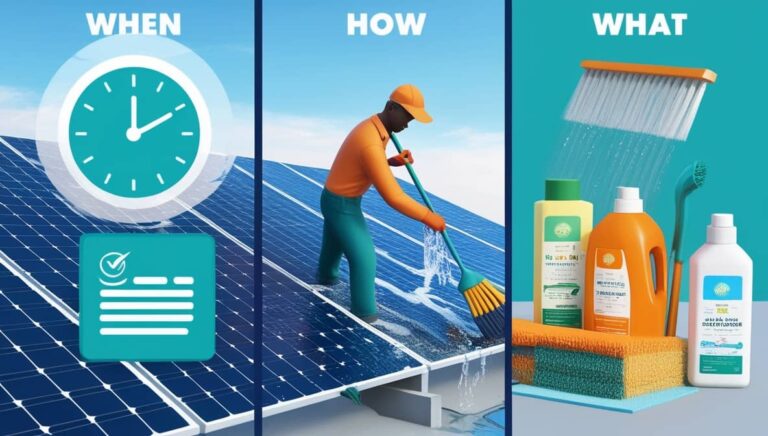Solar panels cleaning, when, how and what?
-
Ko van den Boom
- Reading time: 19 minutes
- Guides, Methods

Cleaning, when, how and what?
You are the proud owner of some solar panels. That’s great! So you are generating your own energy.
But what exactly about cleaning them?
Atmospheric deposits and pollution cause a layer of contamination to build up on your solar panels over time a layer of contamination forms. How should you remove? And is it necessary at all?
Solar panels do indeed get dirty from all types of external dirt: algae, leaves, deposits, bird droppings, falling leaves, twigs. Because high-quality solar modules are treated with a coating, some of the dirt and deposits are washed off after a few good showers. rain washes off. However, some of it always remains on the panels and sometimes some visible contamination such as bird droppings. Here the same advice as bird droppings on your car: don’t leave it too long, it can can damage the protective layer and cause dull spots on your solar modules.
For maximum yield from your solar modules, it is also important to keep them clean. Clean solar panels give the highest yield.
Contents
Ko van den Boom
Main Categories
How often should you clean solar panels?
Once every five years is usually enough to clean your solar panels.
If there are many trees around your house, which often automatically means that there are also many birds, insects, flowering branches and the like, it also means that your solar panels get dirty faster and you will need to clean them (or have them cleaned) sooner.
Do you just like it when your solar panels are nice and shiny? Then you might have to clean them more often too.
First decide whether you want to do the job yourself or prefer to outsource. There are many professional well-equipped cleaning companies that can do the job. Will you do it yourself? Then choose a cloudy day for it.
When to clean solar panels?
Most energy is generated by solar panels in spring and summer. In preparation for this period and to ensure optimal yields, it is therefore useful to clean the solar panels at the beginning of spring. All contamination from last autumn and winter, caused by falling leaves, sand, atmospheric pollution and the like is then cleaned before the new season with hopefully a lot of sunshine begins.
Contact us today
to learn more about adding
products & solutions to your product lineup
How do I clean solar panels?
If you decide to start cleaning your solar panels yourself, it is important to bear in mind some important steps.
Before you start cleaning solar panels, switch off the entire installation. Keep in mind your safety and fall hazards.
To clean solar panels safely, you should use osmosis water. This is purified water free from lime, nitrates, salt and others. Also, cleaning with osmosis water does not leave streaks, which is important for optimum yield from the solar panels.
In case of heavy soiling, it is advisable to use a specialist solar panel cleaner. Do you find algae, moss or other stubborn dirt on solar panels? Then brushing with a special brush that does not leave scratches is necessary.
If you choose a professional cleaner for solar panels, Mavro’s Solar Clean solar panel cleaner is an excellent idea. Until recently available only for professional cleaning companies, Solar Clean is now also available for home use. Solar Clean provides an extra return of approx.5% per year. Safe and effective, Solar Clean is easy to apply to all parts on and around the solar panels, even for stubborn dirt.
Do's and don'ts solar panel cleaning
Always do:
● If you can, prefer to outsource to a professional cleaning company. You have invested a serious amount of money in solar panels, so you want to keep them looking good and protect them for a long time.
● Are you going to do it yourself? Remember your safety on roof, don’t use wobbly ladders or steps.
● Use osmosis water to prevent limescale formation
Above all, don’t:
● Never stand, sit or lean on the solar panels.
● High-pressure spray is not a good idea, jet water under high pressure damages the solar modules.
● Do not work in full sun, preferably choose a cloudy day.
● Do not use caustic cleaning agents or abrasives.
● Do not use salt water or calciferous tap water.
● Do not use scrapers or scouring pads.




